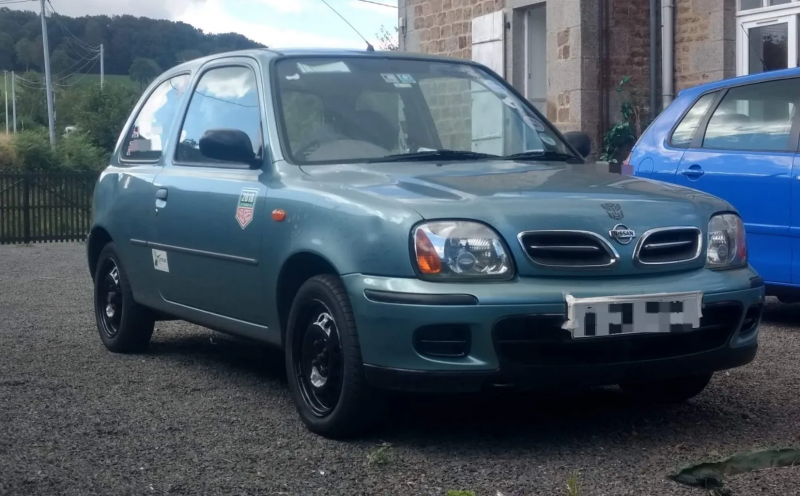
I checked my watch – 8am. I needed to catch the 8:13 bus if I was going to make it to work on time.
Walking out of the door, I turned left towards the bus stop at the end of my road. The sun was shining, the air felt fresh, and Oxford looked beautiful – like the pictures tourists and visitors to the city always post on social media.
This wasn’t normal for me. Normally, I would drive to work – and when you’re stuck in traffic, focused on changing gears, and keeping an eye out for hazards, it’s hard to remember how beautiful a city can be.
I’ve been driving since I was 17, mainly because I wanted independence. My first car was a Nissan Micra; I bought it with savings from my weekend job and a little help from my mum, for which I was extremely grateful. The freedom of getting into my car and going where I wanted, when I wanted (within reason) was indescribable.
Where I grew up in Englefield Green, a small village near Staines-Upon-Thames, it wasn’t feasible to walk anywhere, and there wasn’t much public transport or active travel infrastructure, so driving was a necessity.
By the time I moved at the age of 18 to attend university in Southampton, finally living in a city with a proper public transport network, cycling provision and amenities within walking distance, my driving habit was still locked in – I went everywhere by car.
In the last two or three years, however, I started thinking about my reliance on driving after learning more about and becoming more conscious of my own carbon footprint, and wondered whether I could change my habits.

Then a friend told me about this call out for participants to take part in a research project asking for drivers to give up their car for three weeks, and record what difference it made to their lives, whether that was financial savings, carbon cutting, inconvenience or, an unexpected surprise.
I’ve always cared about the climate and worried about the air quality in my city, even when I was driving, so I took the chance to give it a go.
I work as a scientist, and I’ve always been interested in the clean energy transition, but I haven’t really been walking the walk – quite literally – when I’m driving around a city in a petrol car.
Having been accepted into the car-free challenge, I noticed immediately that my mood was lifted by not being stuck in congestion for my commutes every day.

Getting the bus, I bumped into colleagues, and found that they were just chatting, or even actually getting some work meetings done on the way to the office. I would just watch the world go by or read a book, enjoying the time I had reclaimed from gripping a steering wheel in bumper to bumper traffic.
The air felt cleaner, I took the time to look at my surroundings and appreciate where I lived, and even made some new friends by forcing myself to strike up a conversation with colleagues I’d never really had much contact with before. If I had been driving, I might have missed out on those connections.
The results from the trial, run by climate charity Possible, were astonishing. On average, all of us participants cut our transport carbon footprint by over 50%, and a couple of us virtually eliminated our carbon footprint altogether.
Ten out of 12 of us are cutting down car use for good, and I’m one of three making a drastic lifestyle change as a result of the project – I’m completely giving up my car.

I didn’t really realise I was going to do this until my car failed its MOT. It’s usually like a punch to the stomach but when my mechanic broke the news the other week, I felt a strange sense of relief. Something that had been nagging at me suddenly became possible.
I could finally go car-free for good. If you’d told me this a few months ago, I’d never have believed you, but after trying living life without the use of my car for a few weeks my whole perspective had changed.
It won’t always be easy. During the challenge, I found some journeys harder to swap than others – particularly the ones where I was carrying heavy items, like musical instruments or food shopping.
I also found it frustrating when I’d be trying to get to work and the bus wouldn’t show up on time.
None of these things were enough of a deterrent, however, to override all the benefits I had from going car-free.
But, I understand that this challenge might not be possible for everyone.

Cars do provide a lifeline for many people, including those with disabilities, people with caring responsibilities, and those living in rural areas. Growing up in a rural area myself, I totally understand how cars are necessary.
Driving becomes the only option rather than one of the options available, and the only way to fix it is to improve reliable, effective, and low-cost public transport across the country.
Cities and towns need to accommodate people who want to make a climate-conscious choice, and invest in public transport services, cycling infrastructure and safer streets for people to walk.
It’s a no-brainer for me – I got my bike fixed up when the challenge started and had panniers added, which helped immensely with my shopping. And I’m sure for many others too.
People need to hold politicians and elected leaders accountable for making these decisions.
Going car-free is not just about helping the climate and cleaning up the air. It’s about imagining new ways of getting around our cities, where we feel better in our bodies, enjoying the journey, and sharing the sociability of public transport.
I know it’s not for everyone. But for me, giving up my car is the best thing I’ve done in ages.
Your Daily Horoscope
-

Daily horoscope today: July 23, 2024 astrological predictions for your star sign
For more information, visit wearepossible.org
Do you have a story you’d like to share? Get in touch by emailing Ross.Mccafferty@metro.co.uk.
Share your views in the comments below.

Get need-to-know travel news, inspiration and advice from Metro every week.
Sign up here...
Privacy Policy
Disclaimer: The copyright of this article belongs to the original author. Reposting this article is solely for the purpose of information dissemination and does not constitute any investment advice. If there is any infringement, please contact us immediately. We will make corrections or deletions as necessary. Thank you.





